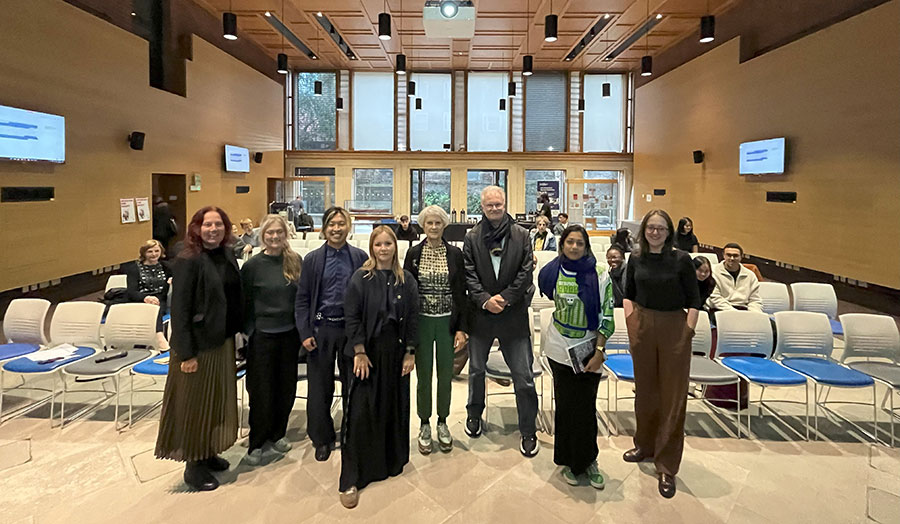London Met team organised a one-day symposium tracing the history of professional activism and what lessons we might learn for the contemporary context.
Date: 30 October 2024
On 12 September Dr Claire Jamieson and Vice Chancellor’s PhD candidate Reishin Kunishima Watabe convened the one-day symposium: Working for what? Architectural Labour: Organising, Work, and Professionalisation. Taking place in the Wash Houses at the Aldgate campus, the symposium gathered over 50 particpants from across academia and architectural practice to discuss the subject of labour organising within the architectural profession in the UK and abroad, and to interrogate the conceptualisation of the architectural worker.
The event aimed to tap into the challenging context for architectural practitioners today, asking speakers from across the industry – from historians to activists and educators – to present seldom known allegories of resistance, collective organising methods and trace a history of professional activism which could be translated into today’s context. Architect Sarah Wigglesworth opened the event with a radical critique of the profession as part of a broader reflection on her career, putting forward a bold vision for how the architectural community could collectively work towards a more equitable governance model and a more optimistic future for the profession. In a panel on the history of architectural unions in the UK, Dr Claire Jamieson presented her research into the Association of Building Technicians – one of the earliest examples of organising within the profession from the beginning of the twentieth century. Ed Bottoms, archivist at the Architectural Association, and Aska Welford a member of the Section of Architectural Workers and an independent scholar, both presented other moments of action and organising from the 1970s in the form of the Architects’ Revolutionary Council and the New Architecture Movement.
These presentations provided the context and historical backdrop from which we heard from four contemporary architectural unions – Sveriges Arkitekter (Sweden), Architectural Workers United (USA), Architekt*innengewerkschaft (Germany), and our own Section of Architectural Workers. Each union presented different models for how an architect’s union can intersect with the key institutions of the profession within the varying national contexts presented – and provided a thought-provoking comparative discussion which demonstrated the power of collective action in our present climate.
The final panel of the day gathered educators and researchers around the critical question of the way forward – asking how the social, economic, political, and professional structures within education and practice have shaped the architectural worker today. Professor Igea Troiani, Head of Architecture at London Southbank University, opened the panel with a powerful neoliberalist conceptualistion of the profession, describing an architectural worker who is perpetually at work, even within their dreams. Shumi Bose, Senior Lecturer at Central St Martins, reflected on the terms in which architectural workers validate themselves and their career, while Eleanor Jolliffe, from Allies and Morrison, critiqued the intellectual architect and loss of making in design. Finally, Reishin Kunishima Watabe presented part of his PhD project, conceputalising the architect through a decolonial and intersectional lens – in particular drawing our attention to the significance (or lack thereof) of the professional title ‘Architect’.
Presented as part of the Centre for Built and Urban Ecologies (CUBE) within the School of Art Architect and Design, the event reprents a growing strand of research being led by Dr Claire Jamieson and Dr Jessica Kelly, who alongside their PhD student Reishin Kunishima Watabe, are interrogating histories of the architectural profession. The symposium specifically sought to engage with not just other academics, but practitioners, activists and students, in line with London Met’s Research and Knowledge Exchange strategy. Themes of intersectionality and decolonialising the profession and its education also formed an important part of the event and the Education for Social Justice framework.
Dr Claire Jamieson explained: 'Too often conversations that interrogate the profession and its histories sit either within academia or within practice, with little discussion between them. We wanted to organise an event that would bring together a broad range of individuals who have a stake in the future of our profession. In positioning historians and academics alongside activists and practitioners, we heard discussions that were more disruptive in their potential, and some exciting and radical ideas emerged.'

